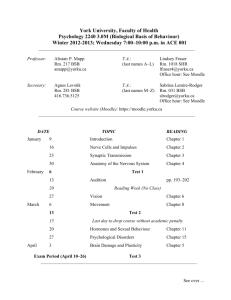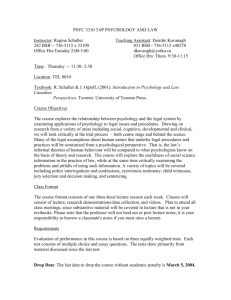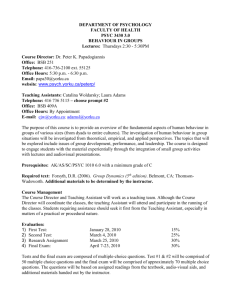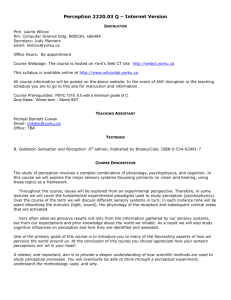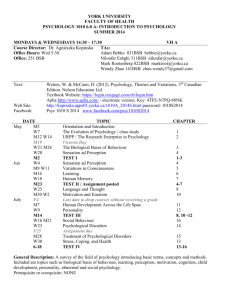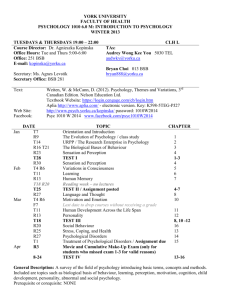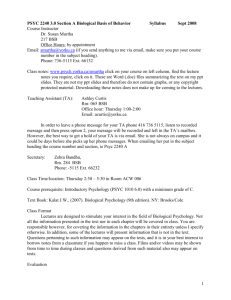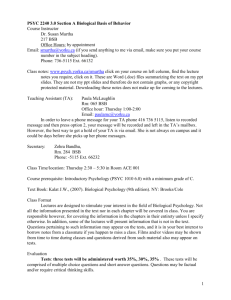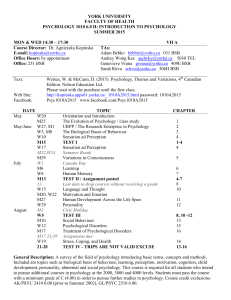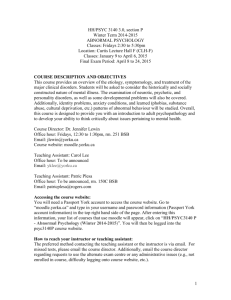Psychology of Women: an overview
advertisement
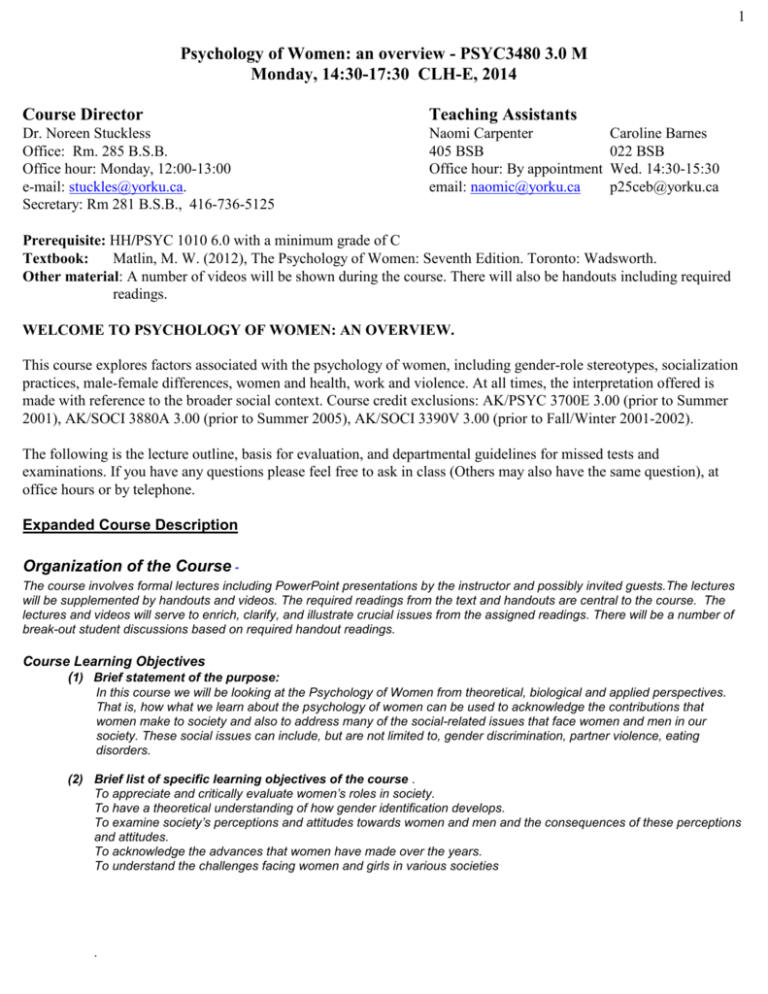
1 Psychology of Women: an overview - PSYC3480 3.0 M Monday, 14:30-17:30 CLH-E, 2014 Course Director Teaching Assistants Dr. Noreen Stuckless Office: Rm. 285 B.S.B. Office hour: Monday, 12:00-13:00 e-mail: stuckles@yorku.ca. Secretary: Rm 281 B.S.B., 416-736-5125 Naomi Carpenter 405 BSB Office hour: By appointment email: naomic@yorku.ca Caroline Barnes 022 BSB Wed. 14:30-15:30 p25ceb@yorku.ca Prerequisite: HH/PSYC 1010 6.0 with a minimum grade of C Textbook: Matlin, M. W. (2012), The Psychology of Women: Seventh Edition. Toronto: Wadsworth. Other material: A number of videos will be shown during the course. There will also be handouts including required readings. WELCOME TO PSYCHOLOGY OF WOMEN: AN OVERVIEW. This course explores factors associated with the psychology of women, including gender-role stereotypes, socialization practices, male-female differences, women and health, work and violence. At all times, the interpretation offered is made with reference to the broader social context. Course credit exclusions: AK/PSYC 3700E 3.00 (prior to Summer 2001), AK/SOCI 3880A 3.00 (prior to Summer 2005), AK/SOCI 3390V 3.00 (prior to Fall/Winter 2001-2002). The following is the lecture outline, basis for evaluation, and departmental guidelines for missed tests and examinations. If you have any questions please feel free to ask in class (Others may also have the same question), at office hours or by telephone. Expanded Course Description Organization of the Course The course involves formal lectures including PowerPoint presentations by the instructor and possibly invited guests.The lectures will be supplemented by handouts and videos. The required readings from the text and handouts are central to the course. The lectures and videos will serve to enrich, clarify, and illustrate crucial issues from the assigned readings. There will be a number of break-out student discussions based on required handout readings. Course Learning Objectives (1) Brief statement of the purpose: In this course we will be looking at the Psychology of Women from theoretical, biological and applied perspectives. That is, how what we learn about the psychology of women can be used to acknowledge the contributions that women make to society and also to address many of the social-related issues that face women and men in our society. These social issues can include, but are not limited to, gender discrimination, partner violence, eating disorders. (2) Brief list of specific learning objectives of the course . To appreciate and critically evaluate women’s roles in society. To have a theoretical understanding of how gender identification develops. To examine society’s perceptions and attitudes towards women and men and the consequences of these perceptions and attitudes. To acknowledge the advances that women have made over the years. To understand the challenges facing women and girls in various societies . 2 Lecture Outline Chapter(s) Topic(s) Jan. 6 1: Introduction Introduction and introductions. What is a psychology of women? Research Issues Video: Gender Jan. 13 2: Gender Stereotypes Gender stereotypes and theoretical perspectives of gender identification Video: Killing us softly III Jan. 20 3: Infancy and Childhood Theoretical perspectives on Gender Identification. Developmental and social factors that influence our beliefs about ourselves and others. Jan. 27 4: Adolescence Developmental factors continued • Handout (will be given out in class Jan. 20) Gender comparisons/Achievement motivation 5: Cognitive Abilities Feb. 3 TEST ONE Feb. 10 6: Social and Personality 8: Love Relationships Feb. 17 READING WEEK Feb. 24 7: Women and Work. Mar. 3 9: Human sexuality 10: Pregnancy, Birth Gender comparisons: Are women always more nurturing and empathic and less aggressive and assertive? Lifestyles: single, heterosexual, lesbian, bisexual, partnership, marriage, divorce. How do stereotypes relate to the workplace? • Handout (will be given out in class Feb. 10) Stereotypes and reality. Changes over the years. Motherhood Mar. 10 TEST TWO Mar. 17 11: Physical Health Women and Health 12: Psychological Disorders Mar. 24 13: Violence Against Women Violence and women. Video, A Love That Kills Mar. 31 14: Older Adulthood 15: ... Attitudes and reality about older women Video: A House Divided Class wrap-up A final examination will be held in the official examination period (date to be announced later) Evaluation: 3 Your final grade in this course is based on two tests each worth 30% and a final exam worth 40% of the final Grade. Each test and exam will include both multiple choice and written answer questions. Test 1 (30%) Chapters 1-5 Multiple choice and written answers October 8 Test 2 (30%) Chapters 6 -10 Multiple choice and written answers November 5 Examination (40%) Multiple choice - Chapters 11-15. Written answers –cumulative, all chapters. Please note that you are responsible for all the material in the text, lectures, handout(s) and videos for the chapters above for your tests and exam. The tests and exam will all include multiple choice and written format questions. Guidelines for Missed tests and Examinations 1) The student must contact me or the course secretary in person or by telephone or email within 48 hours of the test or examination. You must clearly state the following: -your name (it helps to spell your last name) -your student number, -course and section -phone number at which you can be reached - your email address 2) If you cannot contact myself or our course secretary during this 48 hour period, subsequent documentation accounting for the delay must be provided. 3) Appropriate documentation verifying the circumstances for the missed test or examination must be provided. Failure to provide appropriate documentation will result in a grade of F on the missed test/exam. What is appropriate documentation? a) medical circumstances – tests/exams missed due to medical circumstances must be supported by an attending physician’s statement or a statement by a psychologist or counselor. The physician’s statement must include the following: i) full name, mailing address, telephone number of the physician. ii) state the nature of the illness and its duration (i.e., specific dates covered), and iii) an indication of whether the illness and/or medication prescribed would have SERIOUSLY affected the student’s ability to study and perform over the period in question. You must use the recommended on-line form which can be found at http://www.registrar.yorku.ca/pdf/attend_physician_statement.pdf NOTE: the physician's office may be contacted to verify that the forms were completed by the physician. b) non-medical circumstances – tests/exams missed due to non-medical circumstances must be supported by appropriate documentation, i.e., death certificates, obituary notice, automobile accident reports, airline/bus ticket/receipt for emergency travel (with date of booking on ticket), etc. Airline/train/bus ticket/receipts for emergency travel must indicate destination, departure, and return dates. Having to work at the time of a test is not considered a valid excuse for missing the test. 4) The manner in which the missed test (which has been legitimately documented) is handled will be at the discretion of the course director, and will be outlined within the first two weeks of the course. Eg., In the case of a make-up test/exam, the student must be prepared to write the test at a date set by the instructor (this may be as early as a week following the missed test). Although the content to be examined will be the same, the format may or may not follow that of the original test/exam. YOU must check with me or the course secretary for the date and time of the make-up. A conflict in another course during the time of the make-up is not an acceptable reason for missing the make-up (unless there is an examination in the other course at that time). You should be aware that if you miss the tests before the official drop date, you will not have the requisite 15% feedback on your course work to determine if you need to drop the course or not. As a result, it is in your best interest to write the tests at the time they are scheduled by the course director. 4 Cheating/Plagiarism/Impersonation The University does not look favorably on cheating of any kind and the penalties for doing so are very harsh. Become familiar with the rules and regulations regarding cheating/plagiarism. You can find them listed on pages 33-35 of the Undergraduate Psychology Supplemental Calendar. In summary, you can avoid problems by following some simple rules. a) Do your own work and present your own ideas in your own words. Do not merely repeat or reword sections from other sources. b) Don’t copy from friends or neighbors and don’t let friends or neighbors copy from you. c) If you have any doubts about the appropriateness of what you are doing -- ASK. IMPORTANT COURSE INFORMATION FOR STUDENTS All students are expected to familiarize themselves with the following information, available on the Senate Committee on Curriculum & Academic Standards webpage (see Policies and Documents) http://www.yorku.ca/secretariat/senate_cte_main_pages/ccas.htm • • • • • York’s Academic Honesty Policy and Procedures/Academic Integrity Website Ethics Review Process for research involving human participants Course requirement accommodation for students with disabilities, including physical, medical, systemic, learning and psychiatric disabilities Student Conduct Standards Religious Observance Accommodation Course Drop Date: November 8, 2013
